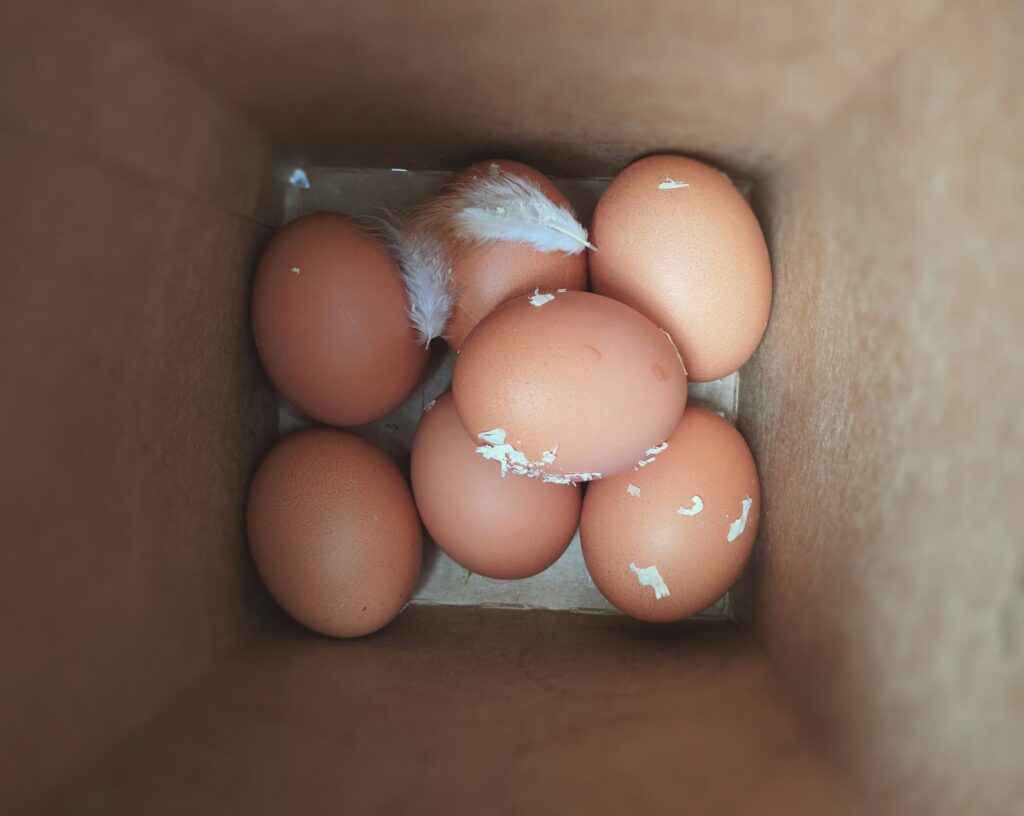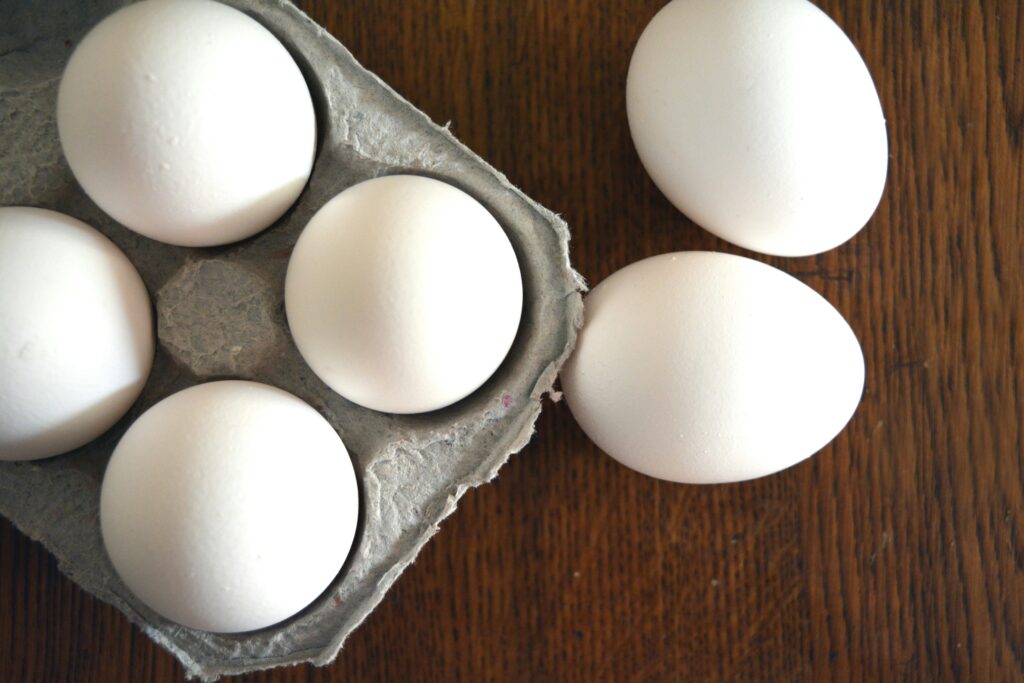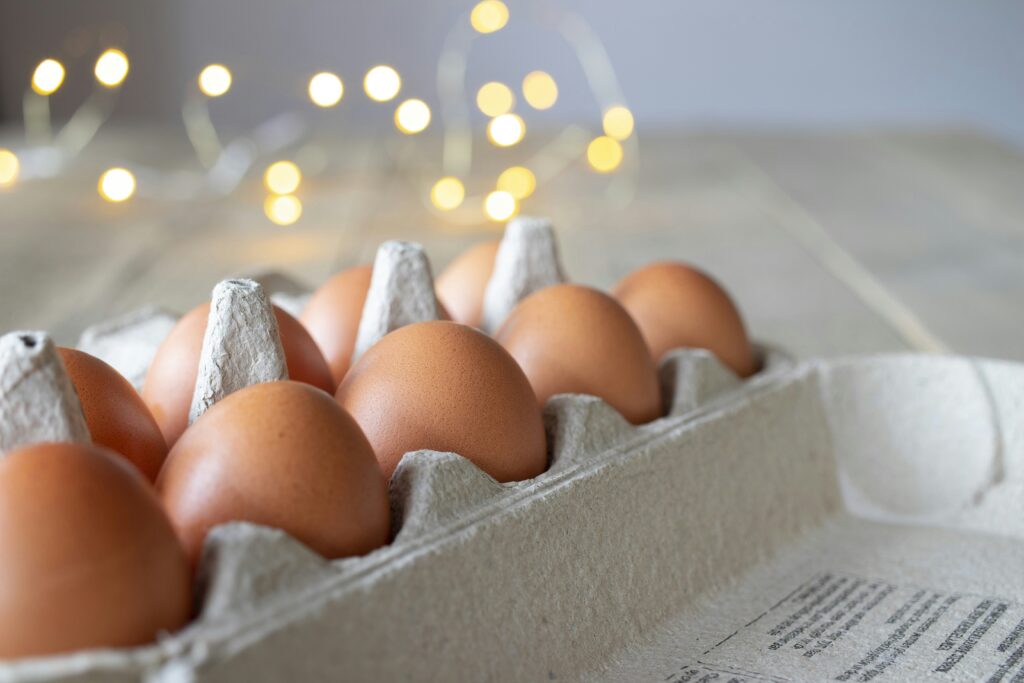Introduction
Farm-fresh eggs have a rustic charm and nutritional edge over store-bought eggs, but one question often arises among backyard chicken keepers and local egg buyers: how long do farm eggs last on the counter? If you’ve got unwashed eggs sitting on your kitchen counter, this comprehensive guide will help you determine how long they’ll remain fresh, how to store them properly, and what signs indicate it’s time to toss them. Let’s crack into it.

Understanding the Anatomy of a Farm Egg
To understand shelf life, it’s important to grasp what makes up a fresh egg:
- Bloom or Cuticle: A natural coating that seals the egg’s pores, acting as a protective barrier.
- Shell: Made of calcium carbonate and semi-permeable.
- White (Albumen): Contains proteins that protect the yolk.
- Yolk: Nutrient-rich center where bacteria are most likely to grow if compromised.
This structure plays a critical role in how long eggs last when left unrefrigerated.
Why Freshness Matters: Farm Eggs vs. Store-Bought Eggs
Farm eggs, especially when unwashed, retain their natural bloom—unlike commercial eggs that are washed and sanitized. This makes a key difference:
| Feature | Farm-Fresh Eggs | Store-Bought Eggs |
| Bloom intact | Yes (if unwashed) | No |
| Refrigeration required | Not immediately | Yes |
| Shelf life at room temp | 2–3 weeks | Not recommended |
Pro tip: Farm eggs can last longer without refrigeration compared to store eggs due to their protective cuticle.
Egg Bloom: The Natural Shield That Affects Shelf Life
The bloom is the game changer here. When left on the egg, it naturally prevents bacteria from entering the shell. Washing the egg strips this away, leaving it more vulnerable.
- Unwashed eggs = Protected + Counter-safe
- Washed eggs = Must refrigerate
Once washed, an egg behaves like any perishable item.
How Long Do Unwashed Farm Eggs Last at Room Temperature?
Unwashed farm eggs last about 2–3 weeks on the counter under ideal conditions.
Variables that impact freshness:
- Ambient temperature: Optimal is 55–70°F (13–21°C)
- Humidity: Moderate humidity slows degradation
- Sunlight: Direct light accelerates spoilage
If you’re unsure how fresh your egg is, the float test is your friend (we’ll get to that in a bit).
Room Conditions: Ideal Temperature & Humidity Levels
To maximize shelf life:
- Store in a cool, dry location
- Avoid windows or ovens—heat ruins the bloom
- Don’t stack or store near odorous foods
A pantry or cellar is your best bet. Even a shaded kitchen counter works well during cooler months.
Regional and Seasonal Factors That Affect Egg Longevity
- Tropical climates: Eggs spoil faster due to heat and humidity
- Temperate zones: Longer shelf life
- Winter: Great for unrefrigerated storage, provided they don’t freeze

Photo by Rebekah Vos on Unsplash
Washed vs. Unwashed Eggs: Which Lasts Longer?
| Storage Method | Washed Eggs | Unwashed Eggs |
| Room Temp | 0–2 days | 14–21 days |
| Refrigerated | Up to 4 weeks | Up to 3 months |
Washing removes the cuticle and accelerates spoilage unless eggs are immediately refrigerated. If you wash eggs, dry them thoroughly and refrigerate ASAP.
Signs Your Counter-Stored Egg Has Gone Bad
Even the freshest-looking eggs can go bad. Here’s how to tell:
Float Test: Quick Freshness Check
- Fill a glass with water.
- Gently place the egg in the glass.
| Result | Meaning |
| Sinks & lays flat | Very fresh |
| Sinks & stands up | Still okay, but older |
| Floats | Bad—discard immediately |
Smell and Visual Inspection Tips
- Sniff it: A sulfur-like odor means it’s rotten.
- Look for cracks, mold, or discoloration: These are visual red flags.
- Shake test: A sloshing sound means the yolk is breaking down—time to toss it.
Safe Handling Practices for Room-Temperature Eggs
Even if unrefrigerated, safety counts:
- Always wash hands after handling eggs
- Don’t reuse cracked eggs
- Cook thoroughly, especially when serving children, elderly, or immunocompromised individuals

Photo by Kotagauni Srinivas on Unsplash
Best Practices for Storing Farm Eggs Without Refrigeration
- Use egg cartons or baskets to avoid direct contact
- Store with the pointy end down to keep the air cell at the top
- Label with the collection date
- Rotate older eggs to the front
Clay Pots, Cool Pantries, and Other Old-School Methods
Before refrigeration was common, people used methods like:
- Zeer pots: Clay + sand + water evaporation for cooling
- Lime water solution: Preserves eggs for months
- Underground storage: Earth naturally maintains a stable temperature
These methods are still used in homesteading and off-grid communities.
When to Refrigerate: Transitioning Eggs from Counter to Fridge
If your eggs reach 2–3 weeks on the counter and haven’t been used, refrigerate them to extend usability. However, once chilled, don’t return them to room temperature, or condensation can breed bacteria.
Common Myths About Farm Egg Storage Debunked
- “All eggs need refrigeration”: Not if unwashed and farm-fresh.
- “Floaters are always rotten”: They’re old, not necessarily bad—but use caution.
- “Washing eggs makes them cleaner and safer”: Only if you cook immediately or refrigerate after.
How Long Do Farm Eggs Last in the Fridge After Counter Storage?
If you store eggs after two weeks on the counter, they’ll last:
- Another 2–3 weeks if unwashed
- About 1–2 weeks if washed before refrigeration
Always use smell and float test to confirm freshness.
Global Perspectives: How Different Countries Handle Egg Storage
| Country | Typical Storage |
| USA | Washed & refrigerated |
| UK | Unwashed & shelf-stored |
| Philippines | Shelf-stored in moderate climates |
| Japan | Refrigerated but unwashed eggs common in small farms |
Egg storage methods vary globally, mainly due to washing regulations and refrigeration access.
How to Extend the Shelf Life of Your Farm Eggs
- Leave unwashed until ready to use
- Store in a cool, shaded spot
- Label with collection dates
- Use older eggs for baking or boiling
- Keep eggs away from strong odors
- Inspect regularly using the float test
- Refrigerate after 2–3 weeks if unused
FAQs
Q1: Can you eat eggs that have been on the counter for 3 weeks?
Yes, if they were unwashed and stored properly. Use the float test and smell check before using.
Q2: Should I wash farm eggs before storing them?
No. Keep the bloom intact unless you plan to refrigerate immediately.
Q3: How do I know if my eggs have gone bad?
Use the float test, sniff for off smells, and check for cracks or unusual spots.
Q4: What’s the best place to store unrefrigerated eggs?
A dark, cool pantry or a cellar is ideal. Avoid sunlight or heat sources.
Q5: Can you refrigerate eggs after they’ve been on the counter?
Yes, but only do it once and don’t leave them out again afterward.
Q6: Are unwashed farm eggs safe to eat?
Absolutely. The bloom provides natural protection if handled hygienically.

Photo by Wouter Supardi Salari on Unsplash
Conclusion
Understanding how long farm eggs last on the counter comes down to respecting nature’s design. The bloom, temperature, and handling practices determine their longevity. By keeping eggs unwashed, storing them in cool spots, and checking for freshness before use, you can safely enjoy farm-fresh eggs without rushing to the fridge.
